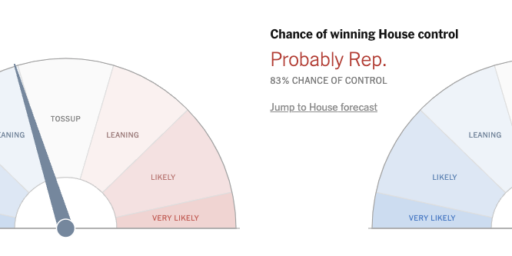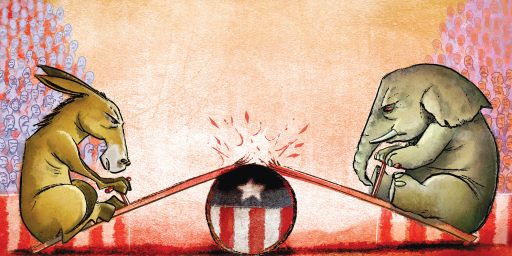A Sunday Afternoon Tab Clearing
- Via Reuters: Son of Colombia’s president admits illegal money entered election campaign -prosecutor.
- Via the NYT: They Checked Out Pride Books in Protest. It Backfired.
- I feel like George Will writes some version of this column every four years: Meet the unusually qualified presidential candidate you’ve never heard of.
- Via AL.com: Whitmire: Tommy Tuberville leaves Alabama lost in space.
- This doesn’t sound good (via the NYT): Elon Musk’s Unmatched Power in the Stars. It is an important story and the piece has some stunning (and dramatic) graphics.
- Via Axios: Trump’s First Amendment defense in Jan. 6 case is shaky, experts say.
- Via the NYT: Trump Leads G.O.P. in Iowa, but His Hold Is Less Dominant.
- Via ABC News: Democrats are drastically overperforming in 2023’s special elections. Is it a clue for Biden vs. Trump?
An analysis from FiveThirtyEight found that in 38 special elections held so far this year, Democrats have outperformed the partisan lean — or the relative liberal or conservative history — of the areas where the races were held by an average of 10%, both romping in parts of the country that typically support the party while cutting down on GOP margins in red cities and counties, too.
[…]
The data from FiveThirtyEight does not include regularly scheduled off-year elections, including the Wisconsin Supreme Court race earlier this year in which the liberal candidate, now-Justice Janet Protasiewicz, won by 11 points — in a state famous for its wafer-thin election margins.
[…]
For comparison, according to FiveThirtyEight, Democrats outperformed the weighted partisan lean by about 4% in special elections held between the 2018 midterms and the 2020 elections, when Biden won the White House by 4.5% but Democrats underperformed in House races.






You’re the political scientist, you tell us!
I know that the conventional wisdom is that they are predictive, but I assume someone must have studied this, and actually teased out roughly how predictive they are (on average, with large enough numbers of special elections).
——
My general sense is that with inflation (inflation may be back under control, but prices didn’t go down, and people will still be thinking a banana should cost $10 rather than $12.50, and always be shocked when they go to the store), general presidential disapproval, etc… if the Republicans had an appealing message they would be doing well.
Alas, their message is spite, anger, hatred, white nationalism, Christian nationalism, and forcing whores to give birth. So they are doing uncharacteristically poorly.
@Gustopher:
Yup. These problems run deeper than messaging. This is an extremist party party that is deeply out-of-touch with the concerns of regular people, whose policy-preferences are unpopular and whose ranks are filled with unlikeable bigots and mentally-disturbed flakes.
It’s remarkable they’re at all competitive. I suspect that without the electoral college and the anti-democratic setup of the Senate, Republicans would be in even deeper trouble than they currently are — for all kinds of reasons.
@Gustopher:
As I understand it, these results should be seen as good news for Ds and bad news for Rs.
@DK:
Indeed, this is part of my overall argument about the problems with our institutions. The Republicans are the minority party, albeit only slightly. But, because of the Senate, the EC, and the exigencies of single-seat districting (especially as linked to primaries), they are more competitive than they should be. This means that have little incentive to adapt to the real competitive environment and, instead, every incentive to maintain the status quo and do whatever it takes to leverage minority power into policy (as with SCOTUS).
The news organizations continue to be surprised (“overperforming”) at the voters’ preference for Democrats. The preference for a non-crazy party has been noted in other comments, and it should not be surprising.
What keeps being dropped from the conversation is the ripping away of women’s rights to control their medical care. I don’t think we’ve had any deaths yet that can be directly attributed to the insistence on pregnancy-slavery, but some women have been mighty sick.
Women are angry! How surprising is that? Not very, in my opinion. But it simply doesn’t exist for far too many commentators. There are a couple of elections coming up in Ohio to ratify the removal of women’s rights to control their bodies. I predict that the results will be wildly on the side of women’s bodily autonomy. I will not be surprised.
Regarding special elections, I know I’ve harped on this before, but the series of special elections I worked in late 1992-1993 was definitely indicative of an overall trend. Republicans in Missouri (this did not used to be much of a thing, astonishingly), won almost every single special election–this was notable because Gov. Carnahan had been picking mostly Reps. and Senators from safe seats to serve in the executive branch after his win. I remember being in a hotel ballroom with some speaker who asked the audience (full of R party election types) if they thought Republicans could win the House. I was one of a handful of people who raised my hand–maybe 2 dozen in a room of hundreds. I think you all remember what happened in 1994….
Long way of saying: this is very interesting.
@Jen: I was reading a book about Watergate over the weekend, and it mentioned that an early sign of the walloping Republicans would take in the 1974 midterms was when Gerald Ford’s old seat, in the special election to replace him after he was appointed vp, was unexpectedly won by a Democrat for the first time since 1910.
One of the ideas I like to keep in mind is that while people can be irrational and hold to hyperbolic expressions, they get considerably more rational and less hyperbolic when money is on the line. Make a bet with someone, that sobers them up.
I think there’s a somewhat similar relationship between polls and voting. People understand when there’s something at stake and when there isn’t. The voting is looking considerably better for Dems than the polls are right now. I put more weight on the voting.